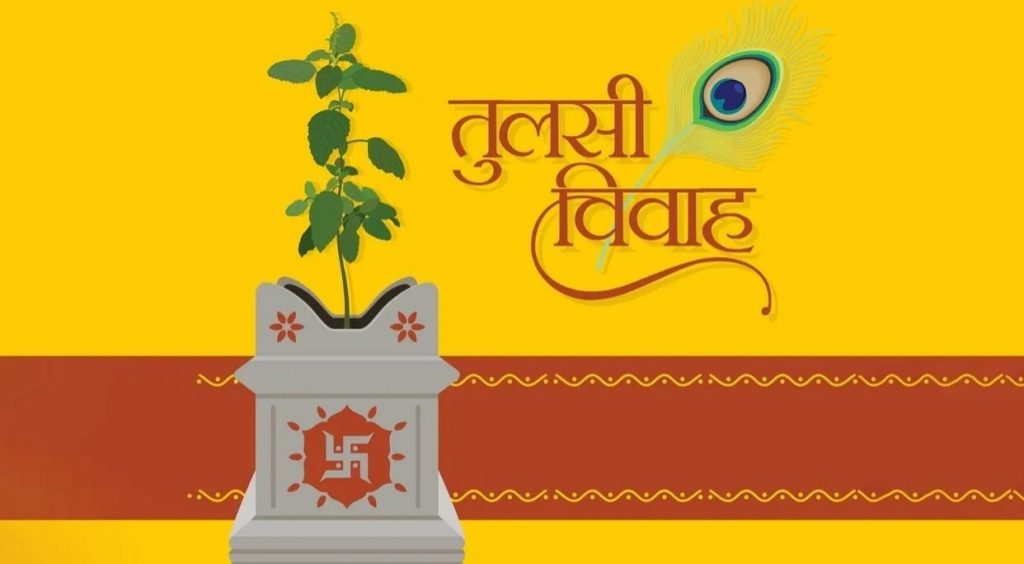Tulsi Vivah 2024 is a deeply revered festival in Hinduism, symbolizing the ceremonial marriage of the Tulsi plant (holy basil) with Lord Vishnu or his avatar Shaligram. This ritual, typically celebrated in the month of Kartik, marks the end of Chaturmas (four months when auspicious events like marriages are avoided) and the beginning of the Hindu wedding season. Beyond its religious significance, Tulsi Vivah also holds deep astrological and cultural importance, bringing divine blessings of prosperity, marital harmony, and spiritual growth.
Tulsi Vivah 2024: Date and Astrological Timing
In 2024, Tulsi Vivah will be observed on:
- Primary Date: November 12, 2024 (Kartik Shukla Dwadashi)
- Alternate Date: November 15, 2024 (Kartik Purnima)
The precise timing, or Muhurta, for performing Tulsi Vivah may vary depending on regional customs. Many devotees observe the ritual on Kartik Shukla Dwadashi, aligning with Dev Uthani Ekadashi, which celebrates Lord Vishnu’s awakening from his cosmic slumber. This period is considered highly auspicious to spiritual renewal and beginning new journeys.
Astrological Significance of Tulsi Vivah
Tulsi Vivah has special astrological relevance. In Hindu astrology, the placement of planets and lunar phases on this day aligns cosmic energies favourably for harmony, marital bliss, and the fulfilment of desires. Here’s a look at the astrological importance:
- Alignment with Dev Uthani Ekadashi
- Tulsi Vivah often coincides with Dev Uthani Ekadashi, the day Lord Vishnu is believed to awaken from his four-month divine rest. This awakening signifies the return of auspicious energies, making it an ideal time for marriage, new beginnings, and auspicious ceremonies.
- Significance of the Kartik Month
- The month of Kartik is considered one of the most sacred months in the Hindu calendar. Rituals and ceremonies performed during this time, particularly those honouring Lord Vishnu and Goddess Lakshmi (symbolized by Tulsi), are believed to bring blessings of wealth, prosperity, and good fortune.
- Tulsi as a Symbol of Planetary Protection
- In Vedic astrology, Tulsi is considered a divine plant that can help counteract malefic planetary influences. Worshipping Tulsi during this period is thought to alleviate the negative effects of planets like Saturn (Shani) and bring protection, especially for those undergoing difficult planetary transits.
- Positive Impact on Relationships and Marriage
- Observing Tulsi Vivah is believed to enhance relationship harmony, foster commitment, and bless couples with marital bliss. Performing or participating in Tulsi Vivah rituals may also favour those seeking marriage.
Rituals of Tulsi Vivah
Tulsi Vivah is celebrated with great devotion and joy, often involving family and friends. Here’s a step-by-step guide to the rituals:
- Preparation and Decoration of Tulsi and Shaligram
- The Tulsi plant, symbolizing the divine bride, is decorated with colourful flowers, jewellery, a small red sari, and sometimes even bridal accessories. The pot housing the Tulsi plant is decorated with rangoli (floral patterns) and other festive adornments.
- A stone or idol representing Shaligram (Lord Vishnu’s form) is placed beside Tulsi, who is dressed as the groom in a dhoti and tilak.
- Offering Sacred Items
- The ceremony begins by offering sacred items such as turmeric, sandalwood, kumkum (vermilion), and flowers to both Tulsi and Shaligram. This step is a gesture of respect and preparation for the marriage ceremony.
- Reciting Vedic Mantras and Katha
- A priest or elder family member recites Vedic mantras to sanctify the ceremony. The Tulsi Vivah Katha (story) is narrated, detailing how Tulsi came to be honoured as Lord Vishnu’s consort and the significance of the ritual. This story emphasizes loyalty, faith, and devotion.
- Conducting the Marriage Ritual
- Similar to a traditional Hindu wedding, the Tulsi Vivah ceremony involves offering rice, sweets, and flowers to the divine couple, symbolizing blessings for fertility and prosperity. Some families even perform a symbolic Phera ceremony (circumambulation around a fire) by moving the Tulsi and Shaligram around each other.
- Completion and Arti
- The ceremony concludes with an arti (devotional ritual of waving a lit lamp in a circular motion) for Tulsi and Shaligram, followed by prayers for blessings, protection, and harmony. Family members and friends gather to sing bhajans (devotional songs) to honour Lord Vishnu and Tulsi.
- Distribution of Prasad
- The offerings made during the ceremony, including sweets, fruits, and rice, are distributed as prasad (blessed food) among family members and guests, symbolizing divine blessings and unity.
The Story Behind Tulsi Vivah: A Tale of Devotion
According to Hindu mythology, Tulsi was once a woman named Vrinda, a dedicated devotee of Lord Vishnu and the wife of demon king Jalandhara. Vrinda’s devotion granted her husband invincibility. However, to end Jalandhara’s tyranny, Lord Vishnu took the form of Jalandhara and broke Vrinda’s chastity. Heartbroken, Vrinda cursed Lord Vishnu to turn into a black stone (Shaligram). She later transformed into the Tulsi plant, which Lord Vishnu decreed as his divine consort. Since then, Tulsi has been regarded as sacred, and her symbolic marriage to Lord Vishnu is celebrated as Tulsi Vivah.
Benefits of Celebrating Tulsi Vivah
- Brings Marital Harmony
- Tulsi Vivah is believed to strengthen marital bonds, foster loyalty, and bring harmony to married life. It is said that couples who participate in or observe Tulsi Vivah receive blessings for a blissful, long-lasting union.
- Inspires Devotion and Spiritual Growth
- Tulsi Vivah is an opportunity to reconnect with spiritual practices, devotion, and gratitude. Worshipping Tulsi and honouring Lord Vishnu can elevate the mind, encourage self-discipline, and promote inner peace.
- Promotes Prosperity and Health
- Tulsi is known for its medicinal and purifying qualities. Celebrating Tulsi Vivah attracts positive energy, brings wealth and prosperity, and protects the family from misfortunes and health issues.
- Support for Unmarried Individuals
- Observing Tulsi Vivah is considered auspicious for those seeking marriage, as it brings divine blessings for finding a suitable partner and entering into a happy marriage.
Observing Tulsi Vivah at Home
For those who wish to celebrate Tulsi Vivah at home, here are some simple steps to follow:
- Clean and Decorate the Area Around Tulsi: Create a clean, sacred space around the Tulsi plant, decorating it with rangoli flowers and lighting diyas (lamps).
- Offer Devotional Items: Place offerings such as turmeric, kumkum, fruits, and sweets around Tulsi and Shaligram to honour their divine union.
- Recite the Tulsi Vivah Katha: Narrate or read the story behind Tulsi Vivah to understand its spiritual meaning and invoke divine blessings.
- Conclude with Arti and Prasad Distribution: Perform the arti and distribute prasad to family members, sharing the blessings of Tulsi and Lord Vishnu.
Conclusion
Tulsi Vivah 2024 is a sacred day filled with devotion, joy, and blessings. By celebrating the symbolic marriage of Tulsi and Lord Vishnu, devotees invite harmony, prosperity, and spiritual protection into their lives. Observing this ritual not only honors ancient traditions but also fosters a sense of unity, gratitude, and connection with the divine. May this Tulsi Vivah bring peace, happiness, and auspiciousness to you and your family as you celebrate this beautiful festival.







